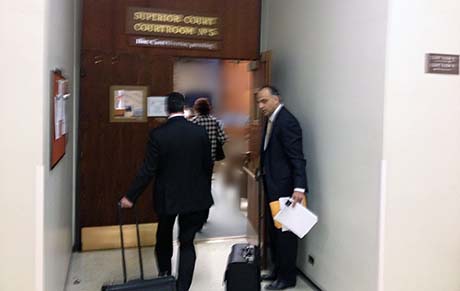Metro and San Jose Inside scored a legal victory Friday with Judge Carol Overton’s ruling that the County of Santa Clara must release documents on the political activities of the nonprofit Santa Clara Family Health Foundation. The documents, handed over to Metro on Friday, shed new light on how a recent ballot initiative was passed, and how the South Bay Labor Council interacts with local nonprofits to advance its agenda.
The foundation had refused to provide documents or grant interviews in March when Metro first began investigating SCFHF’s role in funding the Measure A campaign, a half-billion dollar tax increase over the next 10 years that was approved by voters in November 2012. Directors of nine local nonprofits wrote a March 29 letter that called Metro’s reporting “bad for free speech,” for critically reporting on the events underlying the passage of what they termed “a small sales tax increase.”
On April 16, Metro filed a request for records under the California Public Records Act (CPRA). SCFHF responded ten days later with a letter denying the CPRA request. “Per the direction of our attorney, the PRA does not apply to the Foundation, as it is a private, nonprofit corporation. Therefore, the Foundation is not obligated to and hereby elects not to produce any records responsive to your Request. The Foundation now considers this matter closed,” wrote Board Chair Dana Ditmore.
County officials disagreed, however. Noting that foundation executive Kathleen King was a county employee and that the documents resided on county email servers, the county determined that the documents were public records that should be made available to the public.
SCFHF sued the county last Wednesday in an attempt to block the disclosure. (The county has access to the electronic records because the Health Foundation uses servers and email addresses of Santa Clara Family Health Plan, the public agency that established and provides office space to the non-profit foundation.)
“The Application is denied,” Overton wrote in the Santa Clara County Superior Court ruling. “Petitioner has failed to establish that the subject records in the possession of Respondent are not public records within the meaning of the Public Records Act.
“Moreover, Petitioner has otherwise failed to substantiate its claim that it will be irreparably harmed unless the Application is granted.”
Foundation attorney Ash Pirayou argued in court Thursday that the “sole purpose” for the nonprofit’s existence was to raise money for county health initiatives. But an initial review of hundreds of Health Foundation documents obtained on Friday casts doubt on this claim.
When the county informed the Health Foundation that it planned to release the documents to Metro and San Jose Inside, the foundation’s board held an emergency meeting on on Monday, May 13, Pirayou said.
“Our position is they were clearly public records,” county counsel Donald Larkin argued on Thursday, referring to records retained by Health Plan CEO Elizabeth Darrow, who served as a Health Foundation director until her resignation from its board last year. Larkin added that he redacted some of the documents on Wednesday night, removing private email addresses and other information not subject to disclosure, so that the materials would be ready for distribution pending the judge’s ruling.
Metro’s attorney, longtime First Amendment lawyer Judy Alexander, argued Thursday that the “initial fallacy” in Pirayou’s arguments was that the records actually belong to the Health Foundation, when in fact they were under the control of the Health Plan. She continued that an agency created by a public agency, such as the Health Plan, is subject to the Brown Act.
Noting that the Health Foundation’s website includes the Health Plan and a number of local municipalities in its donor list, “it’s clear that they’re using public money, so the raising of these funds should be subject to disclosure,” Alexander said.
Pirayou noted that Darrow had entered into confidentiality agreements with the Health Foundation, but Alexander countered that “confidentiality agreements don’t trump the Public Records Act.”
Pirayou pleaded with the judge to prevent disclosure of the documents, which he said include trade secrets, fundraising strategies and internal communications that email correspondents never expected to become public records. He added that the release of these documents would have a “chilling effect” on the Health Foundation’s ability to raise funds and communicate with the public, and it would result in open season for Public Records Act requests.

